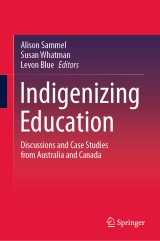Details

Indigenizing Education
Discussions and Case Studies from Australia and Canada|
96,29 € |
|
| Verlag: | Springer |
| Format: | |
| Veröffentl.: | 23.05.2020 |
| ISBN/EAN: | 9789811548352 |
| Sprache: | englisch |
Dieses eBook enthält ein Wasserzeichen.
Beschreibungen
<p>This book provides invaluable guidance for community, school and university-based educators who are evaluating their educational philosophies and practices to support Indigenizing education. The examples from Australia and Canada shared in this book illustrate how Indigenous and non-Indigenous educators have worked together to Indigenize their educational practices, showcasing community empowerment and reconciliation agendas. It also enables beginning educators to gain a meaningful and critical understanding of what Indigenizing education can mean in their own future practice.</p>
Part 1 Indigenizing education: Understanding the importance.- 1 A dialogue around Indigenizing education and emerging themes.- Part 2 Indigenizing practice in community settings.- 2 Financial literacy education in a First Nation community in Canada: Educating for agency.- 3 Re-conceptualising Physical Health Education teacher education through Haudenosaunee values.- Part 3 Indigenizing practice in school settings.- 4 Community and school collaboration: Initiatives that enable Primary students to embed Indigenous Knowledges.- 5 Teaching Reconciliation and Treaty Education through a leveled reading series in Primary schools in Canada.- 6 How embedding Indigenous Knowledge Systems will help the teaching and learning of Western science to evolve.- Part 4 Indigenizing practice in university settings.- 7 Supporting Indigenization in Canadian Higher Education through Strong International Partnerships and Strategic Leadership: A case study of the University of Regina.- 8 Embedding Indigenous Knowledges in Australian pre-service teacher education: A process model.- 9 Indigenising the business curriculum at an Australian university.- 10 Conclusion.
<div>Dr Alison Sammel is both a Canadian and Australian citizen. A non-Indigenous Australian, she was raised on Yugumbeh/Kombumerri traditional lands, and now works on those same lands at Griffith University on the Gold Coast, Australia. Alison lived and taught in Canada for nearly twenty years. Her teaching and research areas include science education, embedding Indigenous knowledge in science education, and she has investigated how whiteness and white privilege impact formal education and disenfranchise First Nations students.</div><div><br></div><div>Dr Susan Whatman is an educator in Health and Physical Education, and Sport Pedagogy, living and working on Yugumbeh/ Kombumerri traditional lands at Griffith University on the Gold Coast, Australia. Susan is a non-Indigenous Australian who was born and raised on Bundjalung/ Minjungbal Country. Her current areas of interest include curriculum development in Indigenous education, Health and Physical Education (HPE), holistic sportscoaching approaches, and supporting pre-service teachers in curriculum leadership on practicum. </div><div><br></div><div>Dr Levon Blue is a Senior Lecturer and the Coordinator of the National Indigenous Research and Knowledge Network (NIRAKN) in the Carumba Institute at the Queensland University of Technology. Levon is a dual citizen of Australia and Canada and is a member of Beausoleil First Nation. Her PhD focused on financial literacy education practices in an Aboriginal community in Canada. Levon is a Chief Investigator on two Australian Research Council funded grants: special research initiative – National Indigenous Research and Knowledges Network (NIRAKN) and Discovery Indigenous – Empowering Indigenous businesses through improved financial and commercial literacy.</div>
This book provides invaluable guidance for community, school and university-based educators who are evaluating their educational philosophies and practices to support Indigenizing education. The examples from Australia and Canada shared in this book illustrate how Indigenous and non-Indigenous educators have worked together to Indigenize their educational practices, showcasing community empowerment and reconciliation agendas. It also enables beginning educators to gain a meaningful and critical understanding of what Indigenizing education can mean in their own future practice.
Explains complex inter-cultural contexts and situations in accessible language Scaffolds knowledge and learning, supporting and encouraging the reader’s understanding no matter what their experience with Indigenizing education Celebrates the scholarship of Indigenous educators, as well as non-Indigenous educators working in partnership with Indigenous academics and communities in the project of Indigenizing education
Diese Produkte könnten Sie auch interessieren:

Community Schools in Africa

von: Deborah Glassman, Chloe O'Gara, Kristin Helmore, Jordan Naidoo, Fred Wood

53,49 €















